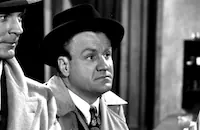That's My Baby
Cast & Crew
William Berke
Richard Arlen
Ellen Drew
Leonid Kinskey
Minor Watson
Richard Bailey
Film Details
Technical Specs

Synopsis
Betty Moody is devoted to her father, comic book publisher R. P. Moody, and is worried about the depression from which he has suffered for twenty years. Moody is equally fond of his daughter, and because of his own failed marriage, tries to refrain from interfering in her romance with comic strip artist Tim Jones, who works for Moody. Tim's would-be rival for Betty's affections is Hilton Payne, Moody's general manager, although Betty has little interest in the stuffy Payne. Acting on the advice of Dr. Calloway, Moody's doctor, Betty calls in Dr. Svatzky, a psychiatric specialist from Prague, who relates a story about a former Spanish king whose melancholy was cured by laughter. Betty and Tim then replace the Moodys' household servants with a variety of entertainers, although Moody is irritated by their hijinks. Tim persuades Moody to watch several acts by telling him that he must choose the performers for an upcoming office party, and although Moody appears to be enjoying himself, he becomes furious upon remembering that the party was held three months previously. Determined to help her father, Betty breaks into his office with Tim and goes through his personal papers in search of a clue about her long-lost mother, who, she believes, is the cause of Moody's depression. Payne catches the pair and informs Moody, who fires Tim the next day. Tim refuses to give up, however, and he and Betty then question Henry Austin, Moody's longtime barber. After Austin suggests that Betty's mother Hettie, an eccentric writer, may be in New York for the play season, the couple head for the city and are able to locate her. Hettie is pleased to reunite with Betty and meet Tim, and confesses to them that she crushed Moody's lifelong dream of becoming an artist when she disparaged his comical drawing of a baby during a dinner to celebrate Moody's thirty-fifth birthday. The ensuing argument caused the tempermental couple to split up, although Moody is still in love with his wife. Hoping to make up for her thoughtless behavior, Hettie takes Betty and Tim to the restaurant where she and Moody had their last dinner together, and by tearing off a patch of wallpaper, they find Moody's old drawing. Tim copies the baby and sets the Moody artists to work creating an animated cartoon of the tyke. Soon after, Betty, Tim and Svatzky take Hettie to the Moody home, where the cartoon mogul is astonished to see his wife. The couple resume their arguing even as they are about to embrace, but Tim interrupts them to show the film, which is called That's My Baby . Hettie and Moody then cuddle on the couch, and Moody, pleased by the antics of his creation, laughs for the first time in twenty years.

Director
William Berke
Cast

Richard Arlen

Ellen Drew

Leonid Kinskey

Minor Watson
Richard Bailey
Marjorie Manners
Madeline Grey
Alex Callam
P. J. Kelly

Billy Benedict
Jack Chefe
Mike Riley & His Musical Maniacs
Freddie Fisher
Isabelita
The Guadalahara Boys
Gene Rodgers
Peppy And Peanuts
Frank Mitchell

Lyle Latell
Alphonse Bergé
Doris Duane
Adia Kuznetzoff
Chuy Reyes
Al Mardo
Pigmeat Markham
Crew
Nicholas Barrows
Bartlett A. Carré
Isabelita Castro
Jay Chernis
Walter Colmes
Eddie Davis
Frank Dexter
Freddie Fisher
Dave Fleischer
Robert Jahns
Alec Law
Robert Pittack
Glenn [p.] Thompson
Percy Townsend
William Tunberg
Irving Wallace

Film Details
Technical Specs

Articles
Ellen Drew, 1914-2003
She was born Esther Loretta "Terry" Ray on November 23, 1914, in Kansas City, Missouri. The daughter of a barber, her family moved to Chicago when she was still an infant and she lived a very quiet childhood far removed from the glamour of Hollywood. She was encouraged by some friends to enter a beauty contest when she was just 17. After winning, she tried her luck in Hollywood, but found that they were no immediate offers for her particular talents.
She eventually took a waitressing job at C.C. Brown's, a famed Hollywood Boulevard soda fountain, and had virtually abandoned her dreams as a starlet when William Demarest, a popular actor's agent and well-known character actor, spotted her. Demarest arranged a screen test for her at Paramount, and she was promptly placed under contract for $50 a week.
For the first few years, (1936-38), Drew got only bit parts, and was often uncredited. When she finally got prominent billing in the Bing Crosby musical Sing You Sinners (1938), she decided to change her name, from Terry Ray to Ellen Drew. She earned her first major role in Frank Lloyd's If I Were King (1938) opposite Ronald Colman, yet for the most part of her career, rarely rose above "B" material and second leads. Still, she had some fine exceptions: Preston Sturges' enchanting comedy Christmas in July (1940), with Dick Powell; Tay Garnett's lighthearted war romp My Favorite Spy (1942) co-starring Kay Kyser; Julien Duvivier's taut The Imposter (1944), holding her own with a brooding Jean Gabin; and Mark Robson's chilling low-budget chiller Isle of the Dead (1945) opposite Boris Karloff. Drew made some notable television appearances in the late '50s including Perry Mason and The Barbara Stanwyck Show, before retiring from the entertainment industry. She is survived by her son David; five grandchildren; and five great-grandchildren.
by Michael T. Toole

Ellen Drew, 1914-2003
Quotes
Trivia
Notes
The working title of this film was Anything for a Laugh. Although a Hollywood Reporter production chart list Charles Butterworth in the cast, he does not appear in the completed film. The appearance of Fred Austin, who is included in the cast by a Hollywood Reporter news item, has not been confirmed. A re-issue print lists George Bahr (Props) in the onscreen credits.














